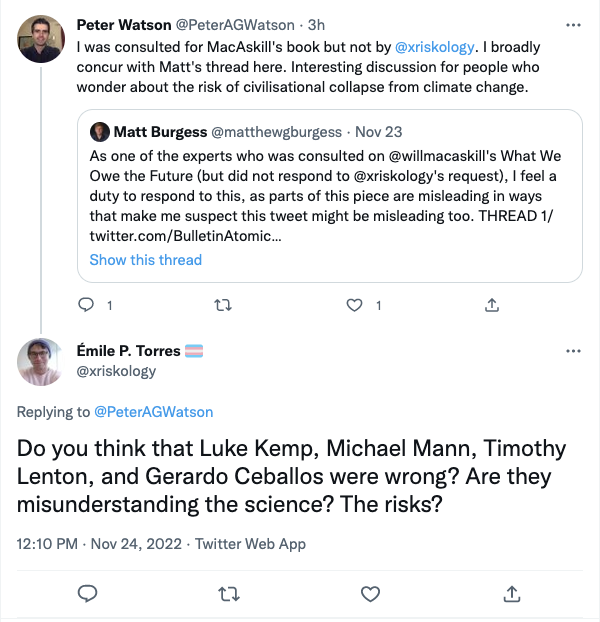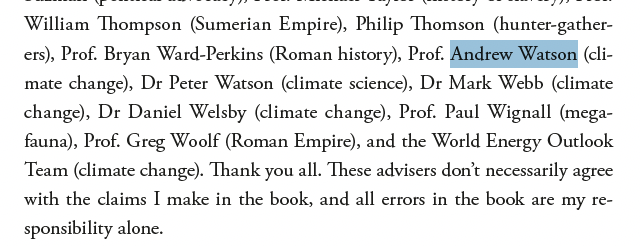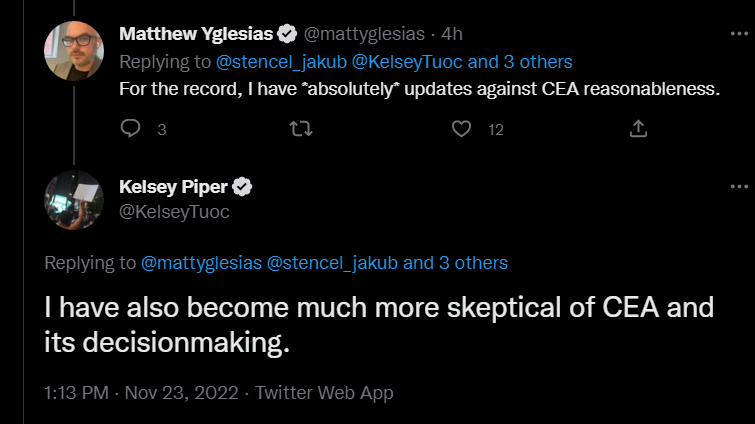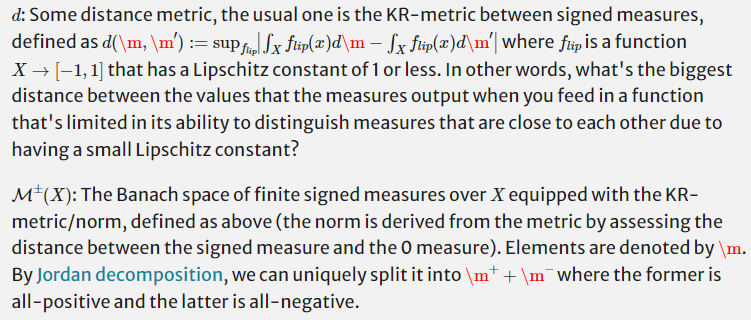Tldr: This is a letter I wrote to the Climate Contributing Editor of the Bulletin Atomic Scientists, Dawn Stover, about Emile Torres' latest piece criticising EA. In short:
- In advance of the publication of the article, Ms Stover reached out to us to check on what Torres calls their most "disturbing" claim viz. that Will MacAskill lied about getting advice from five climate experts.
- We showed them that this was false.
- The Bulletin published the claim anyway, and then tweeted it.
- In my opinion, this is outrageous, so I have asked them to issue a correction and an apology.
Update: The Bulletin has declined to correct the piece or issue an apology. They say that the editor's note provides 'balance' for the reader. They haven't explained how their false tweet remains acceptable. By these standards, media outlets don't have to correct false claims in articles, they just have to include editor's notes contradicting the false claims. There are apparently no constraints on what media outlets are permitted to tweet.
Dear Ms Stover,
I have long admired the work of the Bulletin of the Atomic Scientists. However, I am extremely disappointed by your publication of the latest piece by Emile Torres.
I knew long ago that Torres would publish a piece critical of What We Owe the Future, and on me following my report on climate change. However, I am surprised that the Bulletin has chosen to publish this particular piece in its current form. There are many things wrong with the piece, but the most important is that it accuses Will MacAskill and his research assistants of research misconduct. Specifically, Torres contends that five of the climate experts we listed in the acknowledgements for the book were not actually consulted.
Ms Stover: you contacted us about this claim in advance of the article’s publication, and we informed you that it was not true. Overall, we consulted around 106 experts in the research process for What We Owe The Future. Torres suggests that five experts were never consulted at all, but this is not true — as Will stated in his earlier email to you, four of those five experts were consulted. I am happy to provide evidence for this. The article would have readers think that we made up the citations out of thin air. One of them was contacted but didn’t have time to give feedback, and was incorrectly credited in the acknowledgements, which we will change in future editions: this was an honest mistake. The Bulletin also went on to tweet the false claim that multiple people hadn’t been consulted at all.
The acknowledgements are also clear that we are not claiming that those listed checked and agreed with every claim in the book. Immediately after the acknowledgements of subject-matter experts, Will writes: “These advisers don’t necessarily agree with the claims I make in the book, and all errors in the book are my responsibility alone.”
To accuse someone of research misconduct is a very serious allegation. After you check it and find out that it is false, it is extremely poor form to let the claim go out anyway and then to tweet it. The Bulletin should issue a correction to the article, and to the false claim they put out in a tweet.
I also have concerns about the nature of Torres’ background work for article — they seemingly sent every person that was acknowledged for the book a misleading email, telling them that we lied in the acknowledgements, and making some reviewers quite uncomfortable.
To reiterate, I am very disappointed by the journalistic standards demonstrated in this article. I will be publishing something separately about Torres’ (as usual) misrepresented substantive claims, but the most serious allegation of research misconduct needs to be retracted and we need an apology.
(Also, a more minor point: it's not true that I am Head of Applied Research at Founders Pledge. I left that role in 2019.)
John








I agree it's a different standard, but I don't think it's an unfairly different standard. I think the reason is that people won't see complicated maths/physics knowledge and misinterpret the meaning of a complex topic they don't understand.
For illustrative purposes (screenshot because the text version had some formatting issues not supported by the forum):
If someone stumbles across this and doesn't understand what a Lipschitz constant is, they will likely know they don't understand it, and search it up, or move on. There's basically no common usage of the term "the Banach space". There's a much lower likelihood of harm done by the author wrongly assuming this gap in technical knowledge.
On the other hand, saying someone has a personality disorder, saying they are psychotic, saying they have mental illnesses is much more prone to people thinking, "oh, I know what it means to be a psychopath, I've seen American Psycho". We should be much more careful about assuming knowledge in this space, given words like depression, borderline, psychotic, antisocial, paranoid, obsessive, autistic have meanings in the psychiatry world but also meanings in common parlance which mean pretty different things, the often-poor portrayal of mental disorders in the media, and the continued stigma around mental disorders. For these reasons, I'm less optimistic around the merits of using both bipolar and autistic when speculating about the actions of someone else on a public forum.
I disagree, I think the benefit of saying [concerning set of actions + behaviors and my best guess for what their behavior might be going forward and why] instead of saying I think this person has [diagnosis] is not (for the vast majority of relevant scenarios) that we are losing information that is important, but we are losing speed and concision in communication. But given the risks and potential harm, I think in the vast majority of cases, losing speed and concision is worth it.
I think this might be a crux, and I'd be interested in a hypothetical example that illustrates this. If you can find an example where we are losing important, decision relevant information without explicitly making a best guess at a psychiatric diagnosis (compared to say, a lengthier discussion around how you came to the impression of a suspected diagnosis in the first place), I'll update accordingly-but otherwise I'm not really seeing how we are actually losing important communication. [1]
The hypothetical example has to be suitable for discussion on the forum, and can't include a scenario where you think imminent harm was taking place and needed immediate action, and no one was responding to DMs or something.